
GOVERNMENT’S cumbersome tender process is delaying the procurement of essential medical drugs, leaving many patients in danger of losing their lives, Health and Child Care deputy minister Aldrin Musiiwa has said.
BY MUNESU NYAKUDYA
Musiiwa told journalists on the sidelines of a four-day diabetic training workshop for doctors and nurses organised by Zimbabwe Diabetic Association and Novartis. He said the country’s procurement procedures posed the “greatest challenge” to practitioners and patients alike.
“The tender process in this country is very slow and for us in the medical field we would want a situation where if we have the money we would immediately procure the medications to make them available to the public,” he said.
“But naturally as a government institution there are regulations we have to go through including the tender process which can take some months before we can procure medications.”
Musiiwa added that the rise of non-communicable diseases was an issue of concern and the Ministry of Health has since established a department to deal with these.
He said government was facing funding constrains, making it difficult for patients to collect medicines at public institutions at affordable costs rather than private institutions which were expensive.
“There is now renewed focus. We have been fighting HIV and Aids and we seem to be winning and now our focus is on these non-communicable diseases. We have actually have a bit of funding under the Global Fund so that we can have medicines for these diseases in private hospitals.
- Chamisa under fire over US$120K donation
- Mavhunga puts DeMbare into Chibuku quarterfinals
- Pension funds bet on Cabora Bassa oilfields
- Councils defy govt fire tender directive
Keep Reading
“We are also working with Novartis to ensure that we lower medicines for non-communicable diseases,” Musiiwa said.
“However, our supply system for the medication is still of concern, but the situation has improved. The challenge is that even if we have money as government institutions, we must go through tender and the process takes some time.”
Diabetes has become one of the world’s deadliest killers, with millions dying every year. In Zimbabwe, 10% of people were found to be diabetic in 2005.











